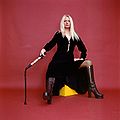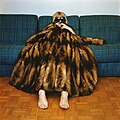Natalia LL
Natalia LL | |
|---|---|
 | |
| Born | Natalia Lach-Lachowicz 1937 Zywiec, Poland |
| Nationality | Polish |
| Education | Academy of Fine Arts, Wroclaw |
| Known for | Artist |
Notable work | Consumer art (1972) |
| Website | nataliall |
Natalia Lach-Lachowicz (born 18 April 1937), known as Natalia LL, is a Polish artist who works with paint, photography, drawing, performance and video art. Sean O'Hagan, writing in The Guardian in 2017, described her as "a neglected early-1970s Polish-born pioneer of feminist avant garde image making".[1]
Biography[]
Natalia Lach-Lachowicz was born in Żywiec, Poland. From 1946 to 1956 Lach-Lachowicz lived in Bielsko-Biała where she completed basic and secondary education. From 1957 to 1963 she studied at the State College of Fine Arts (nowadays Eugeniusz Geppert Academy of Fine Arts) in Wrocław under the supervision of Professor S. Dawski, where she completed her MSc. In 1964 she received a Diploma of the (ZPAF).
In 1970 she co-founded PERMAFO, an artists' group and gallery, with Zbigniew Dłubak and Andrzej Lachowicz. In 1971, after marrying Lachowicz, she assumed the name Natalia LL.[2][page needed] Since 1975 she has been engaged in the international feminist art movement and has taken part in various symposia and exhibitions.
Between 2004 and 2013 she was a senior lecturer at the University of Fine Arts in Poznań.[2][page needed]
In 2018, the ZW Foundation was founded to preserve the works of Natalia LL as well as to provide a "place for exchanging scientific ideas and creative thoughts".[3]
Work[]
Natalia LL is a conceptual artist and photographer, associated with the avant-garde scene of the 1960s in Poland. Through photography and video she deconstructs single-frame photographs and satirizes the images that were presented in advertising, television and print in the 1970s and 1980s. Her series, Consumer Art (1972–1975), depicts close ups of women eating and biting foods like bananas, sausages, and melons. It is often read as a critique, questioning the common representation of women in pornography.[4] "Feminists saw in my consumer art a perverse struggle with the cult of the phallus and with masculinity. For me it was rather the manifestation of a feeling of life and liveliness." [5]
After suffering from a severe illness in the late 1970s, Natalia LL began to delve into transcendental and mythological subjects, often photographing her performances.
In April 2019, after an anonymous complaint, the Polish National Museum in Warsaw removed from an exhibition works by Natalia LL, Katarzyna Kozyra, and the duo formed by Karolina Wiktor and Aleksandra Kubiak. This act, which was seen as an act of censorship of feminist art, led to widespread protests; a movement termed "#bananagate."[6]
Awards[]
- Silver Medal, Medal for Merit to Culture – Gloria Artis, from the Ministry of Culture and National Heritage, Poland, 2007[7]
Exhibitions[]

Solo exhibitions[]
- Natalia LL. The Mysterious World, , 2021
- Natalia LL. Intimate Photography, Galerie Steinek, Vienna, 2018[2][page needed]
- Doing Gender, lokal_30, Warsaw, 2013[2][page needed]
- Natalia LL - Opus Magnum, Ernst Múzeum, Budapest, 2012[2][page needed]
- The Whole of the Parts, Galeria Wangarda BWA, Wrocław, 2005[2][page needed]
- Ogrody personlizmu/Gardens of Personalism, Centrum Sztuki Współczesnej Zamek Ujazdowski, Warsaw, 1998[2][page needed]
- Allusive Space, Frauenmuseum, Bonn, 1995[2][page needed]
- Piramida/Pyramid, Galeria Spojrzenia, Wrocław, 1980[2][page needed]
Group exhibitions[]
- Natalia LL, Józef Robakowski, Ewa Juszkiewicz, gallery lokal_30 at Frieze New York City, 2016[2][page needed]
- Gender Check, Femininity and Masculinity in the Art of Eastern Europe, mumok Museum Moderner Kunst - Stiftung Ludwig Vienna & Zachęta National Gallery of Art Warsaw[2][page needed]
- Rebelle: Art and Feminism 1969-2009, Museum voor Moderne Kunst, Arnhem, Netherlands, 2009[8]
- Darkside - Photographic Desire and Sexuality Photographed, Fotomuseum, Winterthur, 2008[2][page needed]
- La photographie polonaise, Centre Georges Pompidou, Paris, 1982[2][page needed]
- Bienal de São Paulo, Brazil, 1979[2][page needed]
Photo gallery[]

Aksamitny terror, 1970

Sztuka Postkonsumpcyjna, 1975

Śnienie, 1978

Sztuka zwierzęca / Animal Art, 1978

Erotyzm trwogi, 2004
References[]
- ^ O'Hagan, Sean (13 December 2017). "The top 10 photography exhibitions of 2017". The Guardian. London. Retrieved 9 February 2018.
- ^ Jump up to: a b c d e f g h i j k l m n Altmann, Susanne; Wagner, Hilke; Lozo, Katarina, eds. (2019). Medea muckt auf : Radikale Künstlerinnen hinter dem Eisernen Vorhang [The Medea insurrection : radical women artists behind the Iron Curtain]. Köln: Walther König. ISBN 978-3-96098-527-3. OCLC 1099843511.
- ^ "About us". ZW Foundation. Retrieved 2020-04-03.
- ^ Džuverović, Lina. "Natalia Lach-Lachowicz (Natalia LL)". Tate. Tate. Retrieved 14 March 2019.
- ^ Altmann, Susanne; Wagner, Hilke; Lozo, Katarina (2019). Radical Women Artists behind the Iron Curtain. ISBN 978-3-96098-527-3.
- ^ "Hundreds of Protesters Wielded Bananas After a Polish Museum Censored Feminist Artworks". Hyperallergic. 2019-04-30. Retrieved 2020-03-01.
- ^ "60. urodziny ZPAF" (in Polish). Fotopolis.pl. 21 May 2007. Archived from the original on 12 November 2013. Retrieved 12 November 2013.
- ^ Westen, Mirjam (2009). Rebelle: Art & Feminism 1969-2009. Arnhem: Museum voor Moderne Kunst Arnhem. ISBN 978-90-72861-45-0.
General references[]
- Opera Omnia. Wrocław: , 2009. ISBN 978-84-87104-84-8.
- 1937 births
- Living people
- 20th-century women photographers
- 21st-century women photographers
- Polish contemporary artists
- Polish photographers
- Polish women artists
- Recipients of the Silver Medal for Merit to Culture – Gloria Artis
- People from Żywiec
- University of Fine Arts in Poznań faculty




